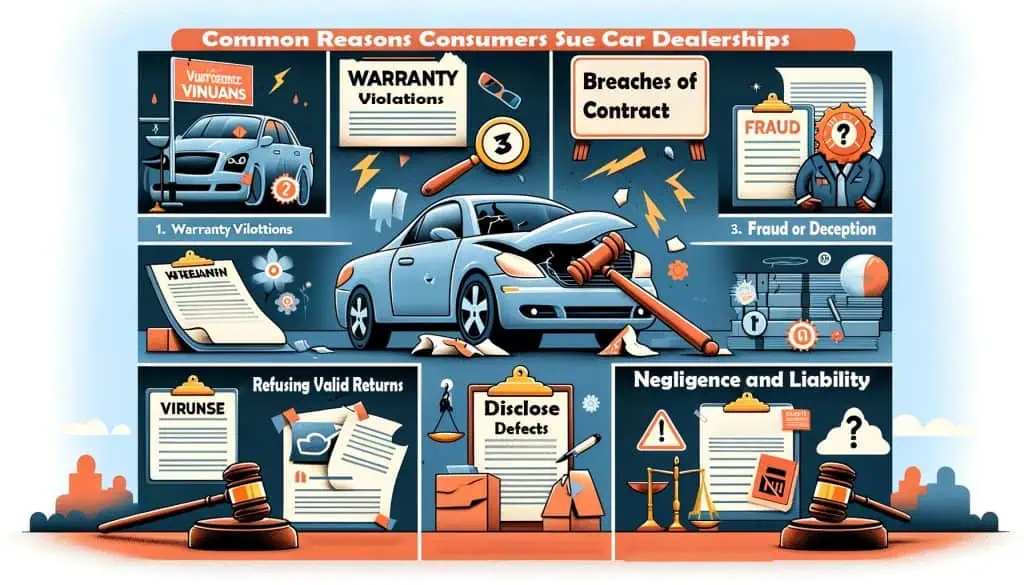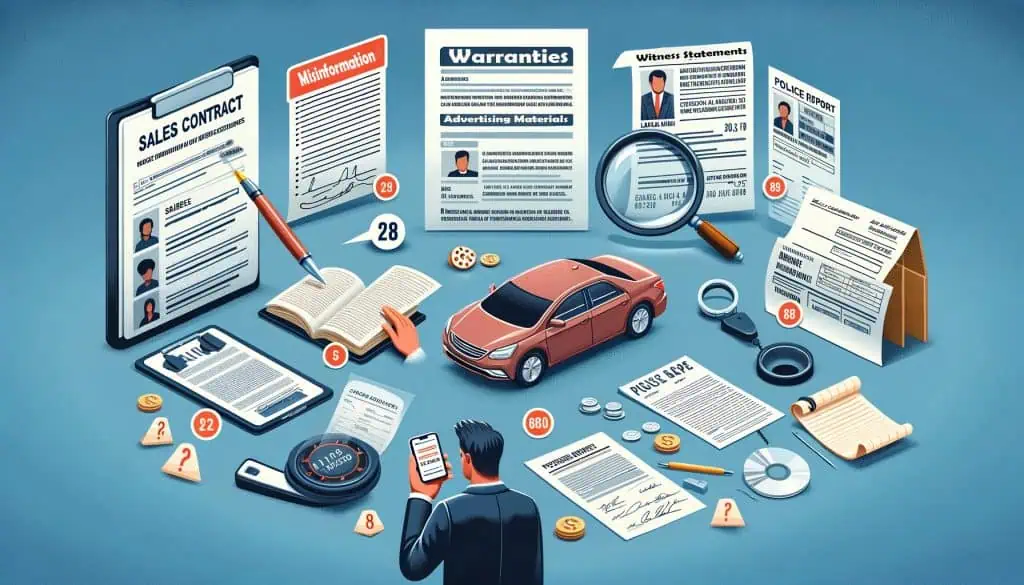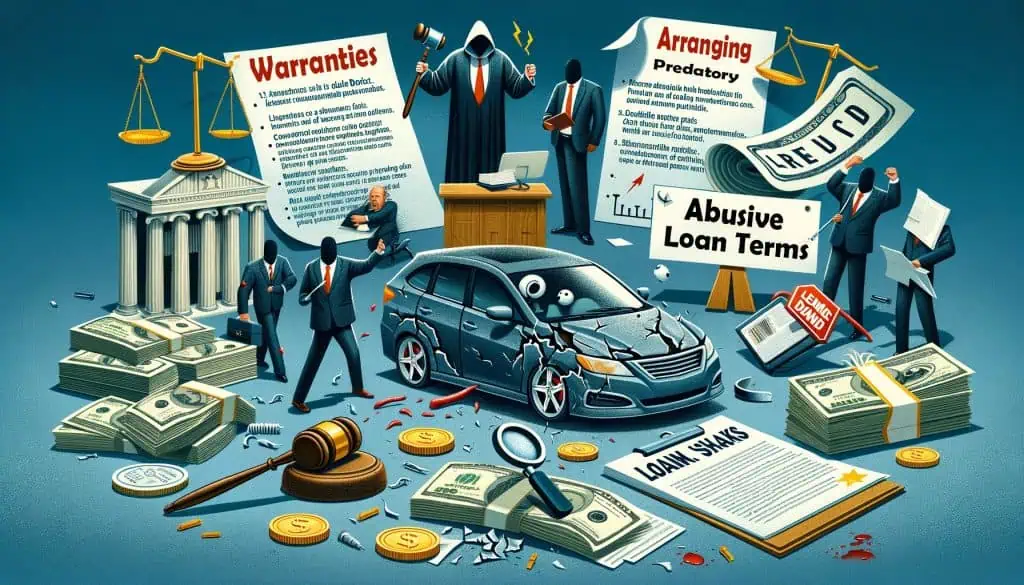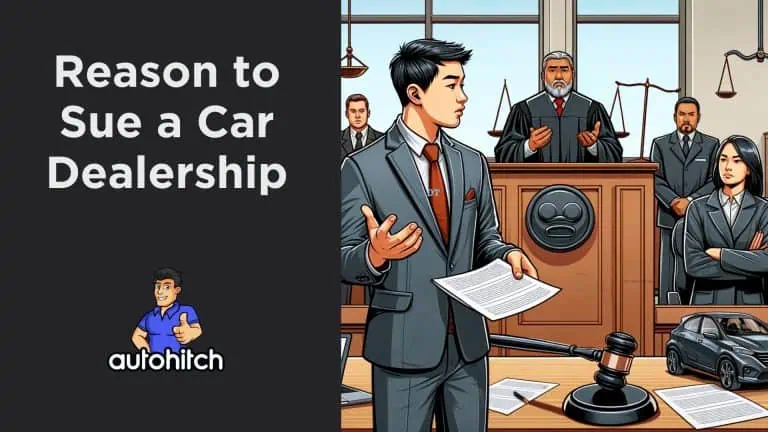While most car purchases go smoothly, there can often be reasons to sue a car dealership to hold them accountable for fraudulent, misleading, or negligent behavior.
In my experience as a car dealer, the top six reasons consumers can file lawsuits against dealers are:
- Warranty violations
- Breaches of contract
- Proven fraud, deception, or misrepresentation
- Refusing valid returns
- Failing to disclose defects
- Negligence and Liability
(I will explain these in more detail below.)
But when exactly should you contact an attorney about potential legal action? This guide examines common scenarios where consumers seek legal remedies against dealerships.
Relevant Articles to Read:
- What Kind of Lawyer Do You Need to Sue a Car Dealership
- Can You Sue a Car Manufacturer
- Can I Sue a Dealership For Not Giving Me a Title
- Possible Red Flags or Signs of a Scam When Buying a Car
- Can I Sue a Private Seller For Selling Me a Bad Car
- Can a Dealership Sell a Car With a Salvage Title
Table of Contents
Can you Sue A Car Dealership?
Yes, a car dealership is like any other business if they act in a manner that causes financial harm or injury to a customer, they are liable.
Common Reasons Consumers Sue Car Dealerships

1. Warranty Violations
If you bought a car that came with a warranty, but the dealer refuses to fix problems covered under that warranty, this violates legal warranty protections. For example, if an engine fails despite having an active powertrain warranty, yet the dealer charges you for repairs, you can recover costs and damages by suing.
2. Breaches of Contract
The sales contract outlines binding promises between you and the dealer. If the dealer breaks terms in this contract – for instance, failing to deliver a car on time or with agreed-upon features – a breach occurs. You can sue to enforce the original agreement or get compensation for losses.
3. Fraud, Deception, Misrepresentation
You can’t merely sue a car dealer for lying to you!
To be able to take the dealer to court you must prove that the lies were deliberate, directly related to the vehicle, and that when the dealer made those statements, they knew they were false.
Examples of Fraud or Deception at a Dealership
The types of lies or misrepresentations a dealer could make that you could sue for would be:
- Falsifying financial terms
- Hiding accident history
- Inventing false features
- Bait-and-switch advertising tactics
*Punitive damages often apply.
4. Refusing Valid Returns
Many consumers assume a 3-day “cooling off” period allowing you to unwind a purchase. If this return right exists by law or a posted dealer policy, yet they refuse a return, you can sue to enforce this critical cancellation option.
5. Failing to Disclose Defects
Dealers must reveal any known material vehicle defects before sale, whether on used or new cars. You have a case if hidden rust damage, faulty airbags, fraudulent odometer tampering, or serious mechanical defects get exposed down the road due to nondisclosure.
6. Negligence and Liability
If the dealer fails to address serious safety issues making vehicles unsafe to drive, customers may have a negligence claim. For instance, selling cars with faulty brakes they were aware of but didn’t fix or disclose can make the dealer liable for resulting injuries or damages if accidents occur.
Warning Signs You May Need a Lawyer
Before deciding to sue, carefully document all interactions with the dealership and evidence showing misconduct.
Consult an attorney if the dealer:
- Refuses to fix issues despite strong proof they are at fault
- Creates major financial damages through fraud or negligence
- Uses intimidation tactics when confronted over problems
- Displays a pattern of similar complaints from other customers
While most disputes get resolved amicably through mediation, unethical dealers leave consumers little alternative beyond litigation.
Additionally, if the claim is between $5,000 and $10,000 (Depending on your state), your case must be settled in small claims court, which does not require an attorney.
MUST READ: What Kind of Lawyer Do You Need to Sue a Car Dealership
Gathering Evidence to Build Your Case

Useful items documenting dealer wrongdoing include:
- Sales contracts, warranties, advertising materials containing misinformation
- Recorded calls/messages related to issues
- Invoices for repairs or unnecessary add-ons
- Police reports for criminal offenses like odometer fraud
- Witness statements corroborating deceptive practices
Photos, account records, and background intel revealing similar lawsuits or complaints also strengthen claims against negligent dealers.
Hiring the Right Attorney for Your Case
When researching lawyers, prioritize these credentials:
- Extensive expertise litigating dealer disputes and consumer auto fraud
- Sufficient resources to counter the dealer’s aggressive legal defenses
- Ability to tap automotive experts supporting technical defect claims
- Track record recovering damages for clients
Many lawyers offer free consultations to assess case merits. Opting for contingency-fee representation also minimizes plaintiff risks and upfront costs.
Key Legal Claims in Lawsuits Against Dealers
Common causes of legal action in lawsuits include:

- Breaching sales contracts, warranties, or advertising claims
- Concealing defects, prior damage, true mileage on vehicles
- Violating consumer protection laws through fraud
- Arranging predatory, abusive loan terms
- Failing to honor state lemon law refund or replacement policies
Recovering financial damages holds dealers accountable while deterring future misconduct harming other buyers. Punitive awards also penalize intentional deception.
Considering Alternatives Before Suing
Litigation is expensive and time-consuming, and considering you are going up against dealerships with very experienced and qualified attorneys, you should seek every remedy possible before hiring an attorney (which will usually require a retainer of around $5,000).
Mediation, arbitration, or filing consumer complaints often resolve disputes faster and cheaper than litigation.
But lawsuits become necessary if an amicable resolution proves impossible. Meticulously documenting how the dealership violated laws or contracts best positions your case.
Frequently Asked Questions About Suing Car Dealerships
Can You Sue a Car Dealership for Not Registering a Car?
Yes, you can sue a car dealer for not registering a car. In most states, dealers are legally required to apply for registration and title on the buyer’s behalf within a certain period after the sale of a vehicle. If they fail to do this, they could be liable for damages, and you may have the right to sue for any losses or inconvenience caused by their failure to register the vehicle in a timely manner.
My Final Thoughts
With persistence and an experienced attorney, consumers can fight back when dealerships cross ethical lines. Truth and transparency should define interactions between businesses and their customers. Suing wayward dealers reinforces that reasonable expectation.



